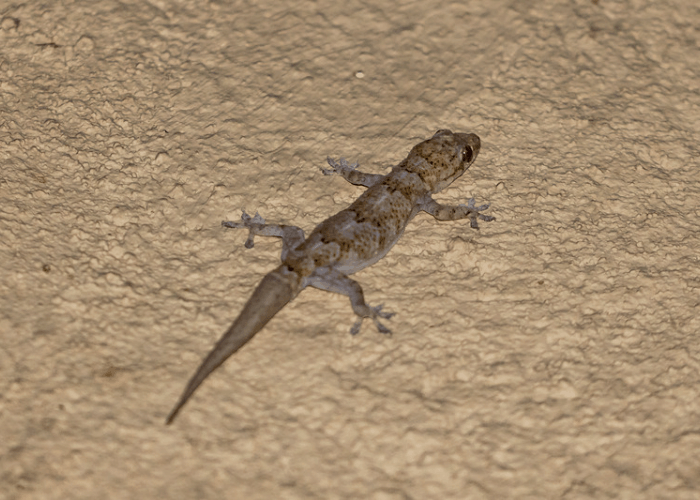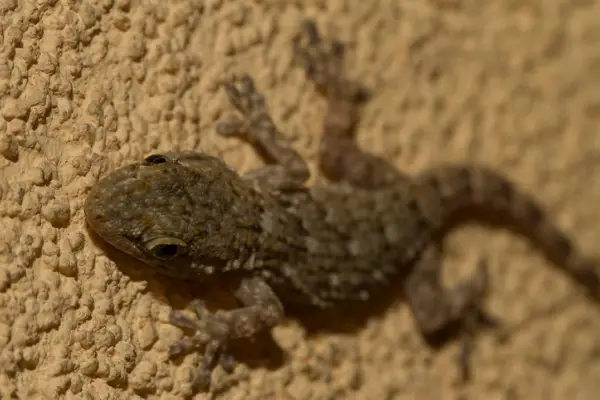If you live in some of the deep south States in the US such as Texas, Georgia or Florida you will have no doubt encountered a gecko invading your home. But, are common house geckos dangerous?
They have several names such as:
- The common house Gecko
- Brown Gecko
- Brown lizard
- House Lizard
These names all represent the same Gecko which is known as the common House Gecko.
You will usually find this small brown lizard clinging to the walls of your home and it can frequently be found darting around your pool area.
For many who see this little gecko for the first time it can be quite scary, you may be questioning if it is dangerous, or is it poisonous?
Well in this guide I am going to answer those questions for you so that you can stop worrying and know your new house mate a little better.

Are common house geckos dangerous? The common house Gecko or brown gecko is a regular sighting in some areas of the US.
Are common house geckos dangerous – poisonous?
The above question seems to be the main concern for anyone who spots a house gecko or brown lizard in their home.
But are common house geckos poisonous? The common house Gecko, brown gecko or brown lizard does not possess poison or venom producing glands, as such it is not poisonous. It does however have small sharp teeth and will bite if it feels that it needs to defend itself from an attack. For this reason it is best to observe the gecko from a distance and not try to grab and hold it.
So there you have it the common house Gecko is not poisonous.
Are common house geckos dangerous?
So above we have worked out that the common house Gecko is not poisonous or venomous. It will not hurt you in that way. But sone animals can still be dangerous.
So is the common house Gecko dangerous? In reality the Common House Gecko poses no threat to humans. It will not bite you as long as you do not grab it and will instead try to run away. That said, it’s poop can contain dangerous pathogens such as Salmonella which can cause problems for humans if it is touched.
Just like the majority of reptiles, house Geckos can carry some nasty pathogens in the insides. When they poop it presents a hazard because people can touch it and then accidentally put their hands near their mouths.
If you find gecko poop it is always best to clean it up with some antibacterial cleaning spray and then wash your hands thoroughly.
Does the common house Gecko bite?
So now we know that the common house Gecko is not poisonous or venomous but could it still bite you? Let’s take a look:
Do Common House Geckos bite? The common house Gecko is a small lizard and as such has a really small mouth and set of teeth. If grabbed the Gecko may bite in defence, however with small teeth and weak jaws it will not hurt to much and will feel more like a little nip.
Because of the above it is probably best to avoid grabbing the Gecko and startling it. A bite from a common house Gecko is generally never serious and should not even puncture your skin.
You may also want to know if crested geckos bite. And what about bearded dragons?
Reasons why you should leave a common house Gecko alone.
There are a few reasons why you may actually want to leave that Gecko alone and live in harmony with it.
You should find that your new little gecko neighbour runs every time ot sees you anyway and will not cause you problems.
But here are some of the benefits of having the common house Gecko around your home:
Pest Contol
The common house Gecko lives on a diet of insects. It is the master of hunting annoying bugs that you may find drive you mad in the summer months.
By letting the Geckos do their thing you will have the perfect bug and Pest controller at hand.
Fun to watch
Just sit back, relax and watch the gecko scampering around. They are fun to watch and super cute.
In fact half of the guides and posts on the Super Crazy Pets website are about pet Geckos. We absolutely love them and actually pay to look after them. If your lucky enough to get to watch one in your home for free, enjoy it.
Conclusion
Are common house geckos dangerous? I hope that this guide to Common House Geckos has eased your mind if you have noticed one around your home.
To go over some key points. Common House Geckos are not poisonous or venomous and even though their poop could contain nasties their bite will not hurt.
They are safe to live alongside and will actually help you with keeping control of the annoying insects that bug you around your home.
